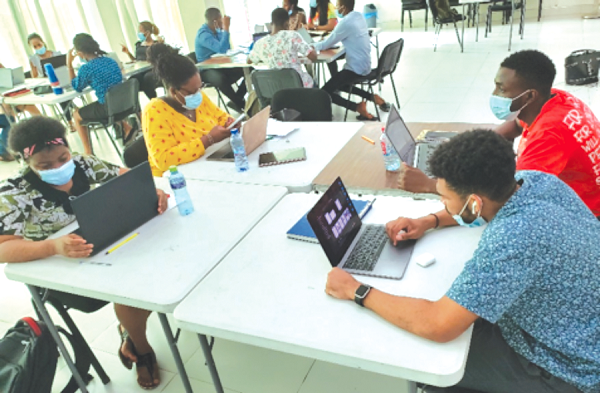
Reflections as journeys into the future
It’s a standard practice in the course I teach – Creative and Critical Thinking – at the Accra College of Medicine (ACM) to allow a particular closure activity. In the last 10 minutes of every session students are asked to do a reflection exercise; that is to say, write down - in an on-going journal - the key takeaways, or some intriguing new thoughts emanating from discussions.
Those exercises finally become book projects and are kept in the school library for posterity.
Advertisement
The following are some scripts (edited for space) from two students: Yaovi Stephanie Selassie and Wilson-Asaan Lean.
Yaovi Stephanie Selassie
A picture says a thousand words without needing to actually speak. It holds a lot of memories, both good and bad, and it’s an important way of providing evidence on past events. However, I believe writing is a much more important way of keeping memories even though it may seem underrated these days.
Writing - or in this context journaling - is not as complex as it sounds. It is simply a way of putting past, present and future thoughts on paper.
For example, when I was younger, I was obsessed with keeping a diary. All girls were actually. We’d write about a boy we wanted to have a crush on at that time and plan weddings all in a diary and even go as far as to name our future children.
These diaries were sacred and were kept under lock and key for our eyes only. Looking back, we seemed so young and full of dreams that never mostly came to past, but were important nonetheless. I have evidence of these past events because I wrote them down. And this brings me to the importance of keeping a Journal of Reflections.
Ever had an important event happen? Something you thought was going to remain cemented in your memory forever because it was so important?
Then as time passed on, you slowly forgot the important details. This is what happens when you don’t write your thoughts down. It’d be as though they never happened at all.
Other Trending Stories
Journaling is important because it provides a detailed way of keeping memories, providing evidence and proof of events. It’s about recording history, reflecting by writing down ideas, inspirations, and corrections.
Something usually funny happens to me. I’d be going out about my day - minding my own business or not - when a thought suddenly comes to mind.
An idea or inspiration. I quite remember I was once passing by a neighbour’s house when I noticed that he was building a pool at home.
But it wasn’t the pool that caught my attention; it was the structure of the pool that did. The pool was being constructed under a big tree that shed a lot of leaves.
This gave me the inspiration to construct a pool at home, but with a pool cover. Unfortunately for me, I did not have any little diary with me, but I did have my phone. I was able to record my thoughts so the idea did not slip away.
Journaling can be done in many forms like recording voice notes, videos or writing. However, writing is the most detailed choice, especially in the medical field.
Prof. Afua Hesse
Weeks back, our class had honour of having Prof (Mrs) Afua Hesse over to give a presentation on the importance of reflective journaling in medicine. Prof. Hesse is a renowned pediatric surgeon and one of the founders of our institution – Accra College of Medicine (ACM). She began with the importance of keeping a detailed journal as a medical doctor.
She said that it’s an essential part of treating a patient in order to reflect on what could have been done better or been avoided.
In a hospital setting, a doctor comes across patients every day with different diseases or illnesses. Some of these ailments can be treated easily but some are peculiar.
It is, therefore, important to keep a journal or records of patients treated, and to go over it at the end of the day.
That helps to reflect on what went wrong, what made it go wrong, and how to avoid it in future.
Wilson-Asaan Lean
In this part of the presentation, I learnt the importance of journaling when learning. First of all, journaling helps in the evaluation of a person.
When I journal, I am able to keep track of events I participated in and to also keep track on my emotions during an event. As I write, I am able to take points or notes on how I felt during a particular point in time and how I can do better when I am faced with the same situation the next time around.
Journaling serves as a point of reference. In my studies, it helps me to look back at a particular topic, how I understood it and the objectives to be achieved. It serves as a good source of active recall when I have upcoming tests.
Journaling also serves as a good practice for documentation. The one thing I remember about the importance of documentation is that it is needed for good record keeping.
"If it wasn't documented, it didn't happen" as my lecturer advised. And that is very true in the field of medicine. Writing a good history and the procedures that you did for a patient serves as good reference points for other doctors who may want information about the patient.
To summarise, journaling helps me to do active recall for my studies. It also helps to keep my emotions in check from similar events that I may have experienced in the past.
The writer is a trainer of teachers, a leadership coach, a motivational speaker and quality education advocate.
E-mail: [email protected]



